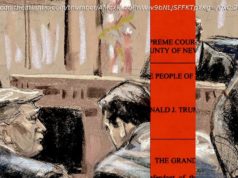Trump’s lawyer says he’s «vindicated.» Hahaha, no.
When President Donald Trump fired FBI Director James Comey on May 9, one line in his letter stuck out as odd: “I greatly appreciate you informing me, on three separate occasions, that I am not under investigation.” Within days, that line had unraveled the White House’s official explanation for why Comey was fired, and revealed that Trump had decided to fire Comey at least in part because of the FBI’s ongoing investigation into contacts between the Trump campaign and the Russian government. And now we know why Trump put that line in the letter to begin with: Comey wasn’ t saying it often enough in public for Trump’s liking, so Trump said it for him. The testimony provided by Comey in advance of a Senate Intelligence Committee hearing Thursday morning, detailing several one-on-one conversations he had with Trump about the Russia investigation (and a related investigation into former National Security Adviser Mike Flynn) , might seem to support Trump on this front. There are, in fact, three conversations in which Comey recounts telling Trump that he is not at present being investigated in the Russia probe. Not being investigated isn’ t the same as being proven innocent. But the language Comey uses is consistent with what Trump said in the letter, though not with the implication that Trump was free and clear of any possible interest from the FIB. Trump and Republicans are reading the testimony as proof not only that Trump was honest in his letter, but that people need to stop making so much of the Russia investigation because the president’s own hands are clean. As Trump’s outside counsel said late Wednesday, “The President feels completely and totally vindicated.” Ironically, though, the president’s anxiety to have himself declared innocent appears to have created a totally different set of problems. The question is no longer whether Trump broke the law with Russia. It’s whether Trump broke the law Comey recalls telling Trump that he wasn’ t directly under investigation on three different occasions: As Susan Hennessey, Quinta Jurecic, and Matthew Kahn point out at, this doesn’ t match up with Trump’s account: Trump told Lester Holt that Comey had asked for the dinner, and had initiated a phone call to assure Trump he wasn’ t being investigated. But the underlying fact — that there are three occasions on which Comey told Trump that federal investigators weren’ t looking at him as a person of interest — appears to be accurate. In fact, the impression left by the prepared testimony is that Trump’s biggest problem with Comey is that Comey was willing to tell he wasn’ t under investigation, but wasn’ t willing to tell the world. Comey had perfectly good reasons for not publicly divulging details of an ongoing counterterrorism investigation. Trump wasn’ t in the investigation; just because it hadn’ t yet identified him as a person of interest didn’ t mean that the FBI wouldn’ t find new evidence pointing to him down the road. In his testimony, Comey indicates he didn’ t want to tell the public anything he’ d feel the need to take back. To him, it was better not to say that Trump wasn’ t under investigation to begin with than to have to go before the public a second time to say that now he was. But he never explained this to Trump — and Trump appears to have fixated on the fact that he wasn’ t under investigation as the panacea that would magically dispel the “cloud” hanging over his head due to the Russia investigation. When Comey wouldn’ t divulge that, Trump did it himself — by firing Comey. Comey’s prepared testimony makes it clear that Donald Trump’s biggest concern was Donald Trump. After an initial conversation in which he tried to urge Comey to let Flynn off the hook — which is a big caveat, since it’s the most plausibly illegal thing in the testimony — Trump’s only concern was for his own innocence, and the public proclamation of that innocence. Ultimately, Trump even accepts the possibility of wrongdoing by “ ‘satellite’ associates” of his — as long as Comey makes it clear that Trump himself is scot-free. The GOP has adopted this as its own ethical standard. The fact that the investigation still involves people who were part of a Republican presidential campaign, or even served in a Republican administration, no longer appears to matter; as long as Trump himself wasn’ t targeted, Trump’s defenders imply, it’s unfair to invest so much importance in the Russia investigation as an evaluation of his White House. But just because Trump was not in fact under investigation by the FBI doesn’ t mean that everything he subsequently did regarding the FBI was ethical or even legal. It doesn’ t justify Trump’s repeated attempts to get Comey to reveal information about an ongoing investigation. It doesn’ t justify Trump’s decision to fire Comey, presumably in part because Comey wouldn’ t publicize Trump’s innocence. It certainly doesn’ t justify the post facto creation of a lie that Comey was fired for reasons other than Trump’s frustration with his handling of an investigation. These facts amount to inappropriate behavior from a president toward a law enforcement agency, and process, that is supposed to be driven by truth rather than political expediency. They amount to a case that Trump really does see the federal government as a tool for him to use according to his whims. The most damning thing Comey could have revealed about Trump was never about Russia — it was about Trump himself.






